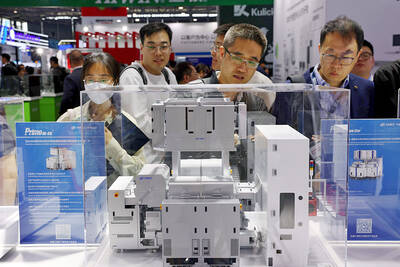SenseTime Group Ltd (商湯科技) has raised US$600 million from Alibaba Group Holding Ltd (阿里巴巴) and other investors at a valuation of more than US$3 billion, becoming the world’s most valuable artificial intelligence (AI) start-up.
The company, which specializes in systems that analyze faces and images on an enormous scale, said it closed a Series C round in recent months in which Singaporean state investment firm Temasek Holdings PTE and shopping site Suning.com Co (蘇寧易購) also participated.
SenseTime did not outline individual investments, but Alibaba was said to have sought the biggest stake in the three-year-old start-up.
With the deal, SenseTime has doubled its valuation in a few months. Backed by Qualcomm Inc, it underscores its status as one of a crop of homegrown firms spearheading Beijing’s ambition to become the leader in AI by 2030.
It is also a contributor to the world’s biggest system of surveillance: If you have ever been photographed with a Chinese-made smartphone or walked the streets of a Chinese city, chances are your face has been digitally crunched by SenseTime software built into more than 100 million mobile devices.
The latest financing would bankroll investments in parallel fields such as autonomous driving and augmented reality, cover the growing cost of AI talent and shore up its computing power. It is developing a service codenamed “Viper” to parse data from thousands of live camera feeds — a platform it hopes would prove invaluable in mass surveillance.
It is also already in talks to raise another round of funds and targeting a valuation of more than US$4.5 billion, according to people familiar with the matter.
“We’re going to explore several new strategic directions and that’s why we will spend more money on building infrastructure,” SenseTime cofounder Xu Li (徐立) said in an interview.
The company turned profitable last year and wants to grow its workforce by one-third to 2,000 by the end of this year.
“For the past three years the average revenue growth has been 400 percent,” Xu said.
Alibaba, the e-commerce giant that is also China’s biggest cloud service provider, could help with its enormous infrastructure needs. SenseTime plans to build at least five supercomputers in top-tier cities over the coming year to drive Viper and other services.
As envisioned, it streams thousands of live feeds into a single system that are automatically processed and tagged via devices from office face-scanners to ATMs and traffic cameras — so long as the resolution is high enough. The ultimate goal is to juggle 100,000 feeds simultaneously.
SenseTime claims about 400 clients and partners including Qualcomm, chipmaker Nvidia Corp and smartphone maker Xiaomi Corp (小米).
It projects several billion yuan in revenue this year, Xu said.
The start-up is expanding its reach across augmented reality, popularized by services such as Snapchat, which impose digital stickers and images on the real world. It is also working with Honda Motor Co to develop autonomous driving systems and is in talks to work with health institutions.

With this year’s Semicon Taiwan trade show set to kick off on Wednesday, market attention has turned to the mass production of advanced packaging technologies and capacity expansion in Taiwan and the US. With traditional scaling reaching physical limits, heterogeneous integration and packaging technologies have emerged as key solutions. Surging demand for artificial intelligence (AI), high-performance computing (HPC) and high-bandwidth memory (HBM) chips has put technologies such as chip-on-wafer-on-substrate (CoWoS), integrated fan-out (InFO), system on integrated chips (SoIC), 3D IC and fan-out panel-level packaging (FOPLP) at the center of semiconductor innovation, making them a major focus at this year’s trade show, according

DEBUT: The trade show is to feature 17 national pavilions, a new high for the event, including from Canada, Costa Rica, Lithuania, Sweden and Vietnam for the first time The Semicon Taiwan trade show, which opens on Wednesday, is expected to see a new high in the number of exhibitors and visitors from around the world, said its organizer, SEMI, which has described the annual event as the “Olympics of the semiconductor industry.” SEMI, which represents companies in the electronics manufacturing and design supply chain, and touts the annual exhibition as the most influential semiconductor trade show in the world, said more than 1,200 enterprises from 56 countries are to showcase their innovations across more than 4,100 booths, and that the event could attract 100,000 visitors. This year’s event features 17

Germany is to establish its first-ever national pavilion at Semicon Taiwan, which starts tomorrow in Taipei, as the country looks to raise its profile and deepen semiconductor ties with Taiwan as global chip demand accelerates. Martin Mayer, a semiconductor investment expert at Germany Trade & Invest (GTAI), Germany’s international economic promotion agency, said before leaving for Taiwan that the nation is a crucial partner in developing Germany’s semiconductor ecosystem. Germany’s debut at the international semiconductor exhibition in Taipei aims to “show presence” and signal its commitment to semiconductors, while building trust with Taiwanese companies, government and industry associations, he said. “The best outcome

Semiconductor equipment billings in Taiwan are expected to double this year, as manufacturers in the industry are keen to expand production to meet strong global demand for artificial intelligence applications, according to SEMI, which represents companies in the electronics manufacturing and design supply chain. Speaking at a news conference before the opening of Semicon Taiwan trade show tomorrow, SEMI director of industry research and statistics Clark Tseng (曾瑞榆) said semiconductor equipment billings in Taiwan are expected to grow by an annual 100 percent this year, beating an earlier estimate of 70 percent growth. He said that Taiwan received a boost from a